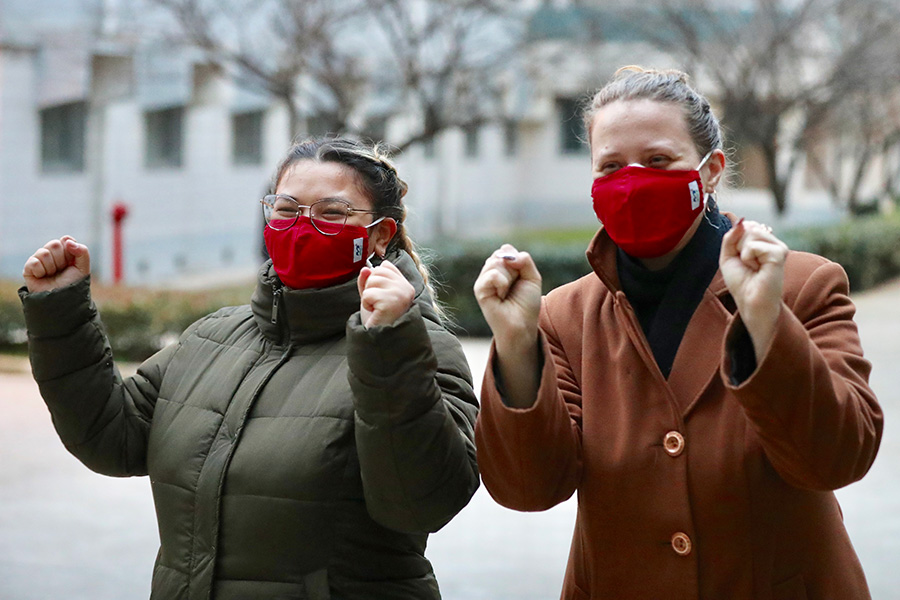Wuhan stays strong as many foreign students remain

After the authorities in Wuhan, Central China’s largest city, announced the city was isolating itself in late January, Gerard Buis, a student of international economics at Huazhong University of Science and Technology, received an email from the Netherlands’ embassy in Beijing asking him to call them.
Buis called the embassy and was told an airplane would fly to Wuhan to evacuate all citizens of the Netherlands. He declined to take the opportunity.
“I really want to stay here,” he said. “Out of love for my Chinese girlfriend, out of solidarity with the Chinese people. And I want to stay here because I think the virus can be overcome.”
Enthusiastic about volunteer work, and having previously been a volunteer in the Netherlands and Belgium, Buis joined volunteer efforts in Wuhan to fight the novel coronavirus outbreak. He has tried to share the latest coronavirus information with other international students, calm their nerves and even has taken out the trash for people who are afraid to go outside.
Quarantined metropolis
Since the outbreak was first reported in Wuhan, capital of Hubei province, in December, it has spread to all other provincial areas of China and some other countries, with new confirmed cases still rising rapidly across the nation.
To contain the outbreak in Wuhan, which has a population of more than 11 million, the city suspended on Jan 23 its entire public transport system — including buses, subway and ferry — to minimize human-to-human transmission of the highly infectious virus. The suspension came just two days before Lunar New Year. Tianhe International Airport and all railway stations in the city were also closed unless for emergency use.
Shashikian Mane, a Russian student pursuing a doctorate in mass media and mass communication at Wuhan University, said she planned to travel across China during the winter vacation but had to change her plan when Wuhan was sealed off. Dorzhak Anzhelika, her friend who is in the first year of master’s degree course in journalism and communication at the university, canceled her plan to visit the Philippines, she said.
“We first heard of the disease at the beginning of January, but it was not so serious at that time, so we did not wear masks, and we were still going around crowded places then,” Mane said.
Anzhelika, who is also from Russia, said foreign students at the university started to get worried after the city announced it would be sealed off. That was when they started to realize how serious the outbreak was.
“We started to get scared and worried about the situation, what would happen next and how would we get through it,” she said. “But our university has given us a lot of support, providing us with masks and three meals a day, so now we feel safer here than in any other places.”
To protect the students from infection, the university has advised them to stay in their dorms and not to leave the campus unless necessary, so Anzhelika now spends plenty of time sleeping, studying and watching TV series and movies in her dorm.
“To be honest, yes, I am afraid. But we shouldn’t panic,” she said. “I believe the government and international organizations can fight the disease.”
Mane said that although she feels safe on the campus, her parents in Russia keep worrying about her and want her to return home.
Tang Yihao, a student supervisor at Wuhan University, said the university has more than 2,000 students from overseas, and about 650 of them did not go back home when the winter vacation started in mid-January.
Since the measures to isolate Wuhan in late January, an increasing number of foreign students have left on planes organized by their embassies in China, he said.
“Every day, some students leave, and now about 400 are still on the campus,” he said.
Choosing to stay
Most Chinese students at the university returned to their hometowns at the start of the winter vacation, and the new semester for all the students at the university, Chinese and foreign, has been postponed until further notice, Tang said.
Although no suspected cases of the new virus have been reported among the international students at the university, it has been on alert and taken strict precautionary measures such as distributing free masks to the students, he said.
“The university cares about us a lot. They bought masks for every international student, and they offer three meals a day for free and even deliver the food to our dorms,” said Vera Syrvasova, from Russia, a student at the college of public administration at Huazhong University of Science and Technology.
“They advise that we stay indoors, but if I need to go outside to buy food and necessary goods, I can go to the nearby supermarket. Our students’ service center is still open, and even two canteens are still operating.”
Buis, from Huazhong University of Science and Technology, said he believes the government measures to control the spread of the outbreak severe but necessary. Only students and teachers are allowed to enter the campus of his university, and they have to undergo a temperature test, he said.
“I like Wuhan a lot. My favorite food is reganmian (a local noodle snack), and I think I cannot live without it,” he said. “It’s good to have a good spirit and help with small things.”
Anzhelika, from Wuhan University, said: “I really like Wuhan. It’s my second home. It really makes me feel sad that the city is sick. We hope Wuhan will get well soon.”
Li Bo contributed to this story.












